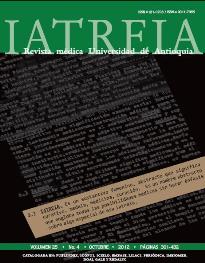Prevalence of urogenital symptoms among Colombian indigenous postmenopausal women
DOI:
https://doi.org/10.17533/udea.iatreia.13132Keywords:
Indigenous Population, Menopause, Quality of Life, Quality of Life Scales, Urogenital SymptomsAbstract
Introduction: Deterioration of life quality in postmenopausal women differs according to their ethnicity.
Objective: To compare the frequency of urogenital symptoms and the deterioration of the urogenital dimension in indigenous postmenopausal women belonging to three different communities.
Methods: By means of the Menopausal Rating Scale, 609 indigenous postmenopausal women, aged between 40-59 years, were studied: 161 (26.4%) belonged to different Amazonic tribes, 297 (48.8%) were Zenu and 151 (24.8%), Wayuu.
Results: Scores in the urogenital dimension were as follows: 3.8 ± 3.2 in the Amazonic women; 6.2 ± 1.3 in the Zenu community, and 2.9 ± 2.6 among the Wayuu. The score for the whole group was 4.8 ± 2.7; all these scores are higher than those of other Colombian and Latinamerican populations. Total score in the MRS was 13.8 ± 8.2 (Amazonic women), 14.7 ± 2.5 (Zenu), and 10.0 ± 6.7 (Wayuu). In the whole group, 9.1% had severe symptoms concerning sexual problems, 48.0% had urinary incontinence, and 12.1% suffered from vaginal dryness. The urogenital dimension was altered in 42%.
Conclusion: Indigenous postmenopausal Colombian women belonging to different communities have high prevalence and early appearance of symptoms related to the urogenital dimension. Half of the studied population, with average age 53 years, have urogenital deterioration.
Downloads
Downloads
Published
How to Cite
Issue
Section
License
Papers published in the journal are available for use under the Creative Commons license, specifically Attribution-NonCommercial-ShareAlike 4.0 International.
The papers must be unpublished and sent exclusively to the Journal Iatreia; the author uploading the contribution is required to submit two fully completed formats: article submission and authorship responsibility.














